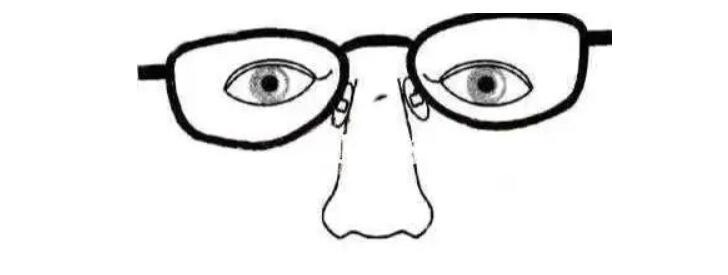
Tips for eye health
Many friends who wear glasses will find that their glasses become crooked after wearing them for a long time...
Such "one high and one low" glasses actually have a great impact on eye health!
What kind of glasses are correct?
A pair of glasses frames are mainly composed of these parts: the lens ring, the nose bridge connecting the two rings, the nose pads supported on the nose, the temples hooked on the ears, the piles and hinges connecting the temples and the rings...
Once any part is deformed or displaced, it may cause the glasses to be crooked.
How do glasses become crooked?

01
Incorrect posture
Taking off glasses with one hand is the most common way to cause the frame to deform, because for most glasses, the frame and the temples are connected by hinges, and there are screws or springs in the middle.
When putting on and taking off glasses with one hand, one side will be pulled apart, while the other side of the temple is still against the face. At this time, the temple and hinge will be pulled outward, causing uneven force on the temple and causing the glasses to become crooked.
02
Glasses are not suitable for high and low ears
Most people's faces are not completely symmetrical, so it is possible that one ear is higher than the other, and high and low ears may indeed cause the glasses to be unbalanced. However, as long as they are reasonably adjusted by professional eyewear institutions, they can be worn comfortably.
03
Long-term lack of maintenance
Glasses are correction tools that need to be worn every day. Over time, even if they have been adjusted in place before, the temples will open and close frequently, causing the screws to loosen or too much dust and grease to accumulate, resulting in astringent nose pads, etc.
Therefore, it is recommended that everyone should develop the habit of regularly inspecting glasses.
The harm of wearing crooked glasses for a long time
The degree of the lens is not the same at every angle, so if the glasses are crooked, the degree of what you see will be different. If you can't adapt, you will experience dizziness, headaches, nausea, etc.
In addition, theoretically speaking, the lens of the eyeglasses is not only based on the degree of the lens, but also includes:
This series of parameters will change as the frame deforms, taking the eye distance as an example:
How to straighten glasses?
If you find that your glasses have been deformed, you should take them to the optical shop in time and find a professional master to adjust them. This is the most correct choice.
In addition to protecting glasses
How should we protect our eyes on a daily basis?
Method 1: Regularly look far away: Looking far away can adjust the ciliary muscles of the eyeball and prevent the ciliary muscles from being in a spasm state.
Method 2: Eye exercise: First let the eyes slowly and forcefully turn to the right, then move the eyeball to the middle part, and then slowly and forcefully turn to the left, and do this back and forth 2 to 3 times.
Next, let the eyes turn down and up, and do this back and forth 2 to 3 times to relax the spasmodic extraocular muscles. You can also close your eyes, rub the palms of your hands together to warm them up, and then put them on your eyes for hot compresses.
Method 3: Blink moderately: When blinking, the tear glands of the eyes can secrete tears, moisten and wash the cornea, make the cornea smooth, and keep the eyes moist, which can effectively prevent dry eyes and other discomfort symptoms.
Method 4: Screen settings: When using a computer, you should also pay attention to setting the brightness, saturation, and hue of the computer screen to keep the screen brightness neither too bright nor too dark.
You can also adjust the angle so that the computer screen tilts slightly downward for eye comfort.
Method 5: Eat eye-protecting foods: Eat more foods that are good for the eyes, such as cod and other deep-sea fish. Deep-sea fish are rich in DHA, which has a certain effect on preventing the formation of cataracts and protecting the retina.
In addition, vitamin A is very beneficial to the eyes. Regular consumption of foods containing vitamin A, such as carrots, lamb liver, egg yolks, etc., also has a certain protective effect on the eyes.